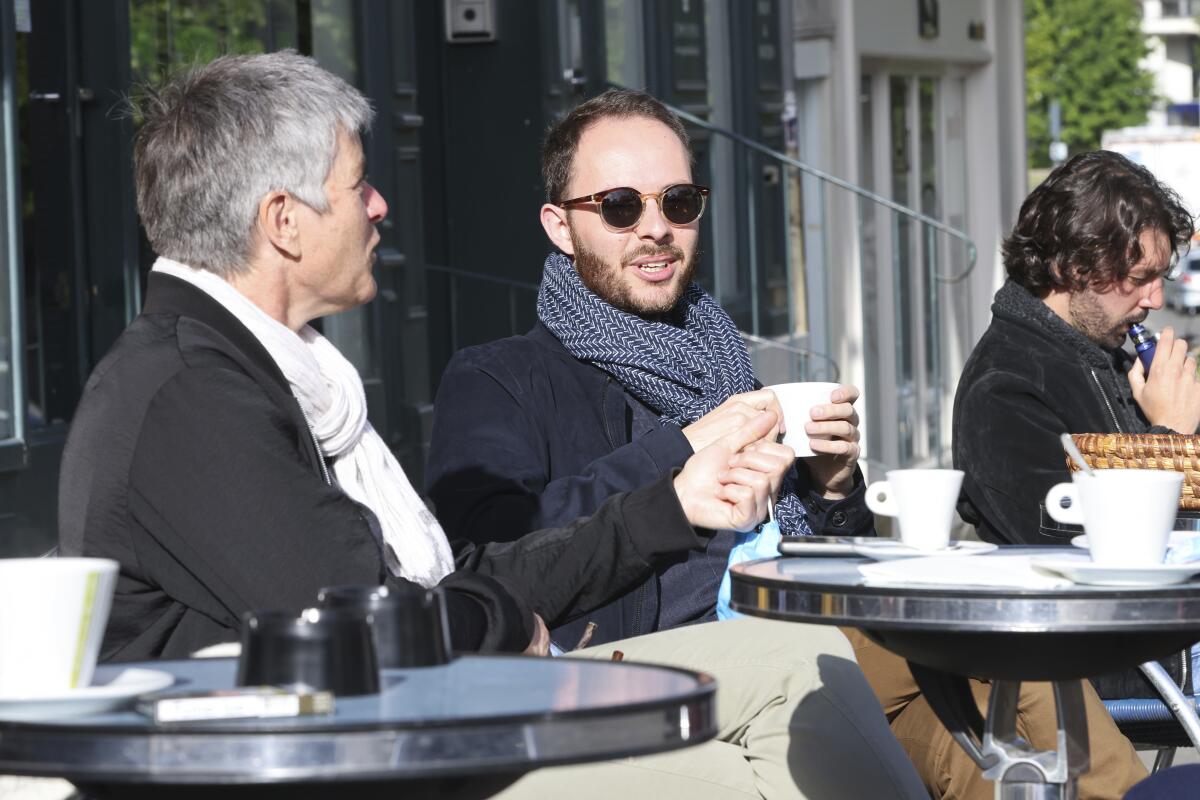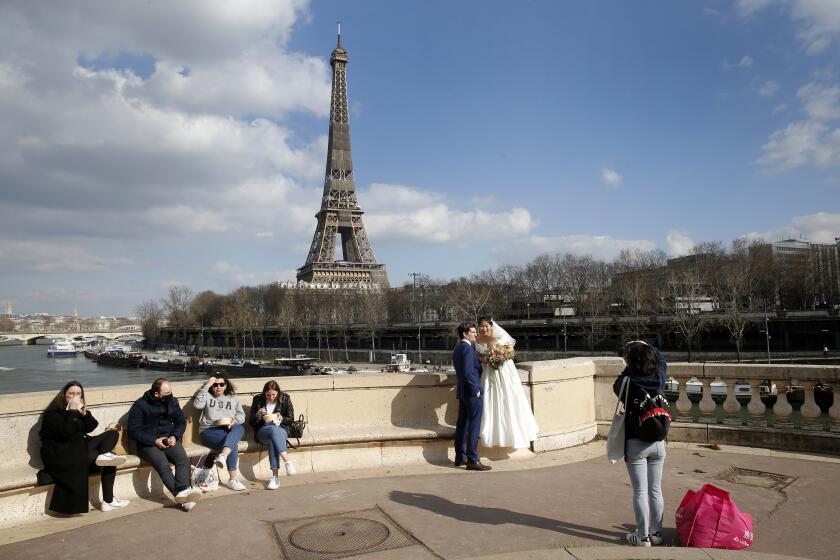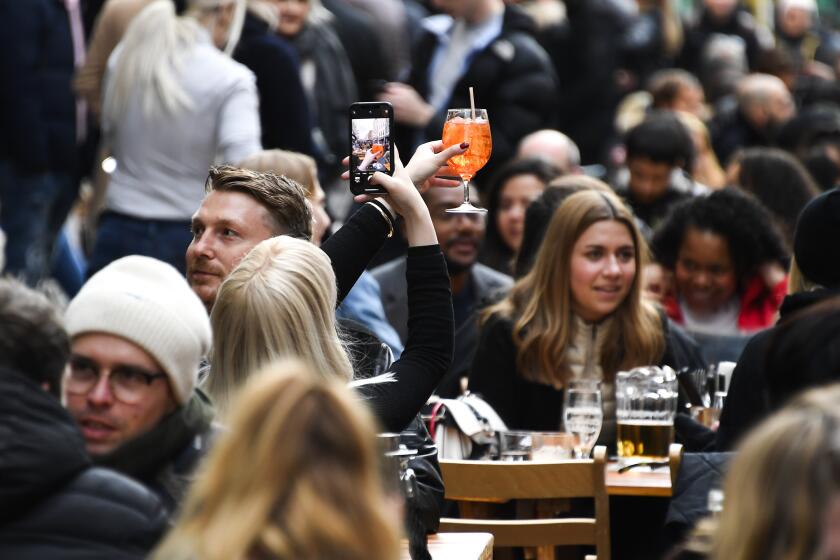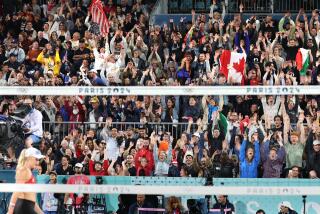A big day out for the French as cafe terraces finally reopen

- Share via
PARIS — It’s a grand day for the French. Cafe and restaurant terraces reopened Wednesday after a six-month coronavirus shutdown that deprived residents of the essence of French life — sipping coffee and wine with friends.
The French government is lifting restrictions incrementally to stave off a resurgence of COVID-19 and to give citizens back some of their signature joie de vivre. As part of the plan’s first stage, France’s 7 p.m. nightly curfew was pushed back to 9 p.m., and museums, theaters and cinemas reopened along with outdoor cafe terraces.
President Emmanuel Macron, among the first to take a seat at a cafe terrace, was seen chatting with customers and with Prime Minister Jean Castex, projecting a mood of measured optimism.
“Let’s get used to try and live together,” Macron told reporters at the cafe. “If we manage to get well-organized collectively and continue vaccinating, have a common discipline as citizens, there’s no reason why we can’t continue moving forward.”
Castex planned to attend a cinema later Wednesday. Actress Emmanuel Beart, meanwhile, went to a movie theater opening in Paris where her latest film, “L’Etreinte” (“The Embrace”), was showing — among the scores of movies produced during the shutdown.
France is not the first European country to start getting back a semblance of social and cultural life. Italy, Belgium, Hungary and other nations already have started allowing outdoor dining, while drinking and eating indoors began Monday in Britain’s pubs and restaurants.
The European Union has taken a step toward relaxing travel for visitors from outside the bloc who have received their COVID-19 vaccination.
Eateries in France have been closed since the end of October, the longest time of any European country except Poland, where bars and restaurants reopened Saturday for outdoor service after being closed for seven months.
French cafe and restaurant owners spent days preparing for Wednesday’s milestone.
Still, the government has put limits on how much fun can be had. Restaurants can fill only 50% of their outdoor seating areas and put no more than six people at a table. Movie theaters can seat only 35% of capacity, while museums must ration entries to give more space between visitors.
Starting June 9, the French government plans to extend the curfew until 11 p.m. and to permit indoor dining. Also on that date, France will begin to welcome tourists from non-EU destinations provided they have some sort of coronavirus passport or health pass. The final phase of the three-stage reopening plan is scheduled for June 30, when the curfew will end and all other restrictions will be lifted, if pandemic conditions allow.
Thanks to an efficient COVID-19 vaccine rollout program, Britain is finally saying goodbye to months of tough lockdown restrictions.
Macron’s plan to bring France out of the pandemic aren’t just about resuscitating long-closed restaurants, boutiques and museums, but also about preparing his possible campaign for a second term. Before next year’s presidential election, Macron is focusing on saving jobs and reviving the pandemic-battered French economy.
France has recorded more than 108,000 deaths from COVID-19, among the highest tolls in Europe. But deaths, admissions to critical care units and the coronavirus infection rate are now on the decline.
Dr. Michel Slama, chief of the intensive care unit at Amiens Hospital, said his stance, like Macron’s, was “optimistic but prudent.”
“We are attentive about the reopening, but ‘worried’ is not the word,” he told the Associated Press. “There has been a significant drop in emergency hospital admissions for the virus in France. That’s good news. The high vaccine rate now we hope will help us avoid a new wave.”
News Alerts
Get breaking news, investigations, analysis and more signature journalism from the Los Angeles Times in your inbox.
You may occasionally receive promotional content from the Los Angeles Times.
About 40% of France’s adult population has received at least one COVID-19 vaccine dose — but that rate is still well behind Britain’s 70% and behind several other EU nations.
Tourists waited excitedly as the cordon around the world’s most visited museum and home of the “Mona Lisa,” the Louvre, was finally lifted.
“It means a lot, you know. It means COVID-19 is starting to finish, when it’s the opening of all museums and public areas,” said visitor Walid Hneini.
Benoit Puez, a Parisian art lover, was more understated but still pleased about France opening up.
“Maybe I didn’t really miss it, but we are happy it’s reopening. It’s a stage,” he said.
More to Read
Sign up for Essential California
The most important California stories and recommendations in your inbox every morning.
You may occasionally receive promotional content from the Los Angeles Times.












